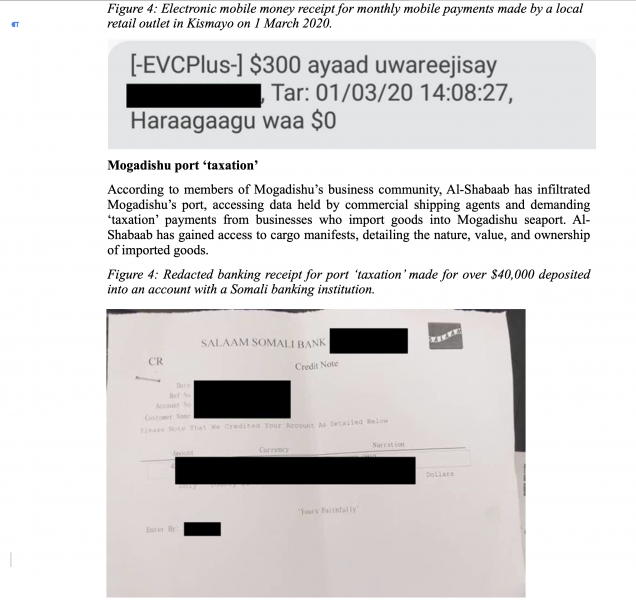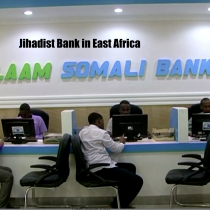ALSO IN THE NEWS

UN Report shows Al-Shabaab's infiltration in Salaam Somali Bank
A new report released by the United Nations Sanctions Panel on Somalia has documented that Al- Shabaab remains financially strong in Somalia through a deep infiltration network in Somalia's financial system. Al Shabaab generated about $13 million (Sh1.3 billion) between December 2019 and August 2020. The report states that "Al Shabaab remains in a strong financial position and is generating a significant budgetary surplus, some of which is invested in property purchases and businesses in Mogadishu". The U.N. report says that the group had funded various small- and medium-sized businesses, including in Mogadishu's main Bakara market which sells everything from guns to food. The report includes details on two bank accounts held at Salaam Somali Bank, founded in 2009 as part of the Hormuud group of companies.

The Salaam Somali bank of Hormuud Telecom Group links to terrorists Al-Shabaab .
Harakat al-Shabaab al-Mujahideen, more commonly known as Al-Shabaab, is a terrorist, jihadist fundamentalist group based in East Africa. Established in the late 1990s, the Somalia-based terror group seeks to establish a fundamentalist Islamic State in the country that it hopes will ultimately expand to encompass the whole Horn of Africa. Al-Shabaab controls much of the southern Somalia region and small pockets in Kenya and Ethiopia along the Somalia border.
According to extremism monitoring portal counterextremism.org, "Al-Shabaab’s ideology is typically described as a brand of Salafism and Wahhabism that supports takfir, the excommunication of apostates or unbelievers. Though it has stated many goals in the past, the group fights first and foremost to create a fundamentalist Islamic State in the Horn of Africa that would include not only Somalia but also Djibouti, Kenya, and Ethiopia”. The portal also notes that Al-Shabaab has had several sources of income throughout its history, including varying degrees of support from the Somali diaspora, locals, sponsors, and sustained dawa (proselytizing).

A new report released by the United Nations Sanctions Panel on Somalia has documented that Al- Shabaab remains financially strong in Somalia through a deep infiltration network in Somalia’s financial system. Al Shabaab generated about $13 million (Sh1.3 billion) between December 2019 and August 2020. The report states that "Al Shabaab remains in a strong financial position and is generating a significant budgetary surplus, some of which is invested in property purchases and businesses in Mogadishu”. The U.N. report says that the group had funded various small- and medium-sized businesses, including in Mogadishu’s main Bakara market which sells everything from guns to food. The report includes details on two bank accounts held at Salaam Somali Bank, founded in 2009 as part of the Hormuud group of companies.
The report also documents how Al Shabaab maintains its finances through extortion of civilians. In the government-controlled southern port of Kismayo, businesses are forced to pay the insurgency between $300-$600 monthly depending on their size, which could earn them nearly $6 million a year from Kismayo alone, the report says. "The Shabaab also have penetrated Mogadishu’s port, blackmailing importers to pay a levy on goods, the report said. In all the cases the report documented, business owners paid up, citing threats and violence if they refused.”
The UN report has observed that the militants have been storing and transferring money through accounts ran in local banks in the country. The money, the report adds, is used in investing in the real estate within and outside the country. "Al-Shabaab’s use of formal banking systems enables the immediate transfer and distribution of large amounts, including in areas it no longer directly controls, eliminating the risk of physically transporting cash across hostile territory.” Over a 48-hour period in May, more than $322,000 was transferred from these two accounts to a third bank account, the report said, showing "an institutional link between the accounts and an organized approach to the distribution of funds”.
The findings of the reports not only show the deep infiltration of Al-Shabaab in the banking and financial sector of Somalia but also raises concerns over the efficiency of policies and measures designed to curb terror-financing in the country.
Leave a comment
| Copyright © 2009 - 2026 Sunatimes News Agency All Rights Reserved. |
| Home | About Us | Diinta | Reports | Latest News | Featured Items | Articles | Suna Radio | Suna TV | Contact Us |
 0
0 









UN Report shows Al-Shabaab's infiltration in Salaam Somali Bank
A new report released by the United Nations Sanctions Panel on Somalia has documented that Al- Shabaab remains financially strong in Somalia through a deep infiltration network in Somalia's financial system. Al Shabaab generated about $13 millio